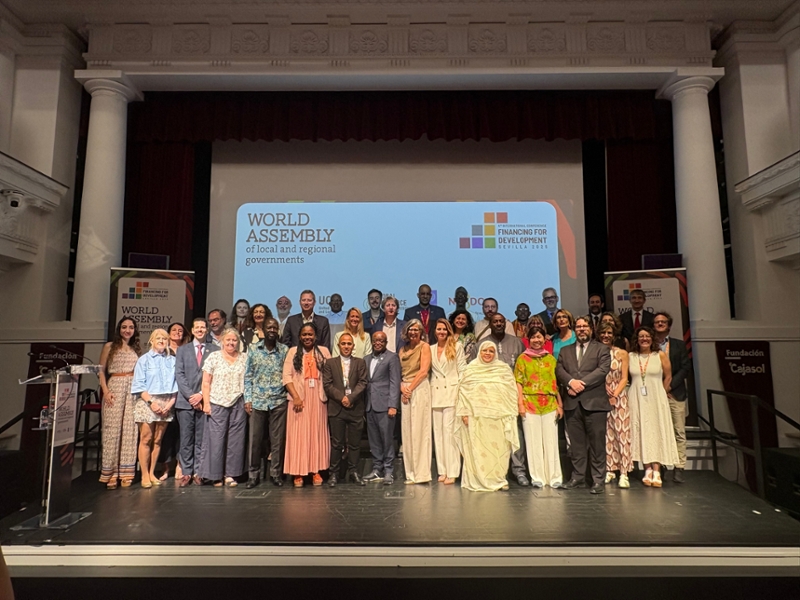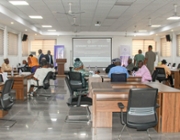Call for change in development financing for local government

18 July 2025
CLGF joined with other members of the Global Taskforce to call for a change in the way development is funded at local government level.
The Fourth International Conference on Financing for Development (FfD4) took place in Seville last month. A United Nations conference, Ff4D focused on reforming the international financial architecture that exists to support sustainable development, particularly in relation to the Sustainable Development Goals (SDGs). It brought together government leaders, international organisations, civil society, and the private sector to address challenges in development finance.
Decentralising finance
Given the critical role which local and regional governments play in the delivery of many of the key services at the heart of achieving the SDGs, it was important for our sector to be represented, and to call for financing to take account of the importance of decentralising finance to the local level.
The World Assembly of Local and Regional Governments was convened by the Global Taskforce of Local and Regional Governments and was held in the run up to the main Ff4D on 30 June and 1 July, 2025. It was facilitated by UCLG, with the support of the City of Seville and UNDP. The Assembly brought together political leaders and local actors from all regions of the world, including many from the Commonwealth.
Renewed global financial architecture
CLGF was represented by Secretary-General, Lucy Slack, who joined mayors, governors, ministers, youth leaders, institutional partners, and development actors, all of whom had had gathered to assert a shared vision: that finance must serve people, territories, and the planet. The Assembly reaffirmed that public investment, local services, and the commons must be at the heart of a renewed global financial architecture grounded in democracy, proximity, and sustainability.
Rich discussions at the two-day meeting focused on:
- strengthening the role of cities in global governance;
- the need for reforms to ensure global finance reaches the local level; and
- the importance of local and regional governments being part of the global financial architecture to reflect their role in development and in addressing climate change.
The meeting also highlighted that collaboration and partnerships, including with local and regional government, are essential if the SDGs are to be achieved.
Importance of data
The sessions provided an opportunity to share experiences of innovations in local financing, including with the private sector, especially at a time of fiscal scarcity; and the importance of accurate data and transparent monitoring systems in underpinning local decision-making and action.
Outcomes
The main outcome of the Assembly was a political document adopted by the organised constituency: the GTF Statement to FfD4. Structured around three key axes - ensuring access to finance through decentralised mechanisms, prioritising investments in public services and the commons, and establishing a permanent mechanism to monitor subnational finance - the statement reflects the consolidated priorities of the local and regional governments constituency. It builds on long-standing demands for expanding fiscal space, increasing access to concessional and blended finance, scaling up support to inclusive local services, and institutionalising multilevel co-governance in global financial negotiations. It also builds on the political momentum towards an enhanced status for local government in the UN system.
Subnational finance
During the Assembly the participants welcomed the fact that the Ff4D process included a paragraph on subnational finance in their main Outcome Document - supported by 192 out of 193 UN Member States. Whilst this is important, the Assembly emphasised that it is essential not to move backwards given the commitments made a decade ago in paragraph 34 of the Addis Ababa Action Agenda, which recognised the role of local and regional governments in sustainable infrastructure, tax collection, and participatory governance.
From recognition to structural change
In this regard, the constituency continues to call for a shift from recognition to structural change: the creation of participatory country platforms, direct access to finance, and a truly multilevel governance system in which local and regional governments contribute alongside national governments, financial institutions, and development banks.
CLGF Secretary-General Lucy Slack said: “As CLGF members stressed at our own Conference in 2023, access to adequate resources is essential to ensure resilient communities. The local and regional government community meeting in Seville further reinforced this position, emphasising that localising finance must be seen as an imperative to delivering development for all, and ensuring that no one is left behind”
For more information, read the GTF outcomes statement and access the full Ff4D Seville Commitment.
Back to News





